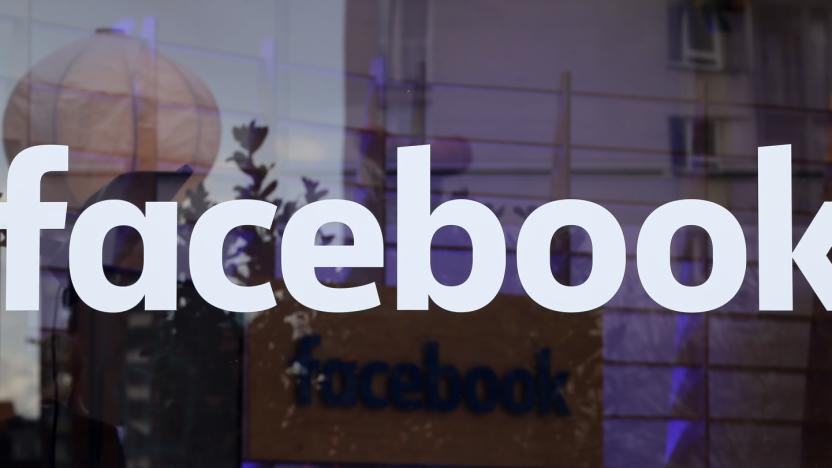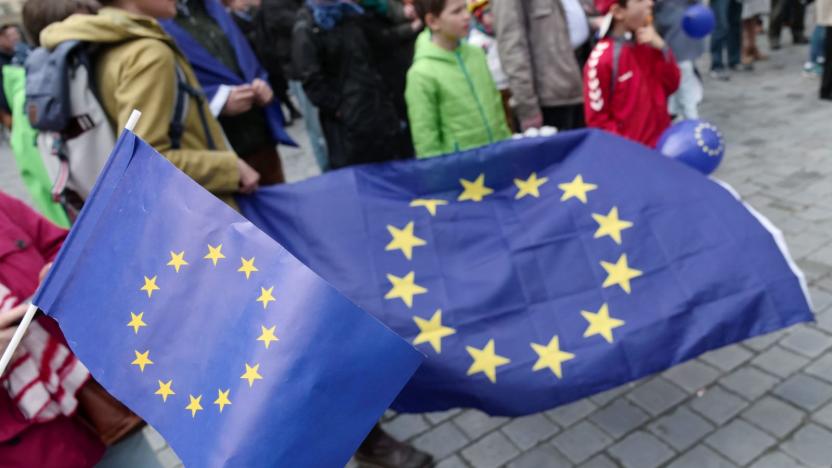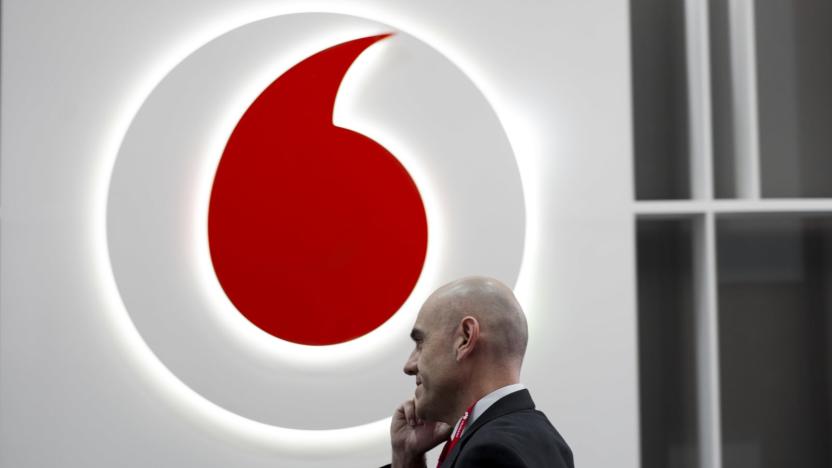europeanunion
Latest

O2 eases roaming strain by secretly throttling data speeds
On June 15th, mobile roaming was more or less abolished across the EU. Great news for anyone wanting to drum up Instagram envy with their holiday snaps, but it's easy to forget the technical challenges -- all of a sudden, cell towers have to deal with domestic traffic and countless non-native phones vying for an uplink. It's something O2 seems ill-prepared for, having recently been caught throttling the life out of roaming connections in Dublin, Ireland.

EU tells companies to stop stalking their employees' Facebooks
Companies shouldn't be allowed to inspect the Facebook and Twitter accounts of prospective job candidates, unless there is an appropriate "legal ground" for doing so, a European group dedicated to data protection has ruled. In a guidance "opinion" document, the Article 29 Working Party said employers should first consider whether the candidate's account is meant for personal or business purposes. In addition, they should only reviews posts or "data" which is "relevant to the performance of the job which is being applied for." Under no condition should companies force a potential employee to friend the recruiter or make their profile public.

EU proposes banning encryption backdoors
The European Union might want it to be easier for police to obtain data, but that doesn't mean it'll be easy for officers to read that data. The European Parliament has proposed amended regulation that would not only require end-to-end encryption when available, but forbid backdoors that offer guaranteed access to law enforcement. EU residents need to know that the "confidentiality and safety" of their data is "guaranteed," according to the draft, and backdoors risk "weakening" that privacy.

Estonia is first in the EU to let cute delivery bots on sidewalks
Starship Technologies' delivery bots have been dropping off lunches in Europe and the US with increasing regularity, and governments are slowly warming to the idea. State legislatures in Virginia and Idaho recently granted official permission for small delivery robots to operate on sidewalks, and now Estonia(!) has offered its approval as well. The measure passed 86 to 0 in the country's parliament yesterday, making Estonia the first country in the EU to officially bless these adorable, food-slinging robots.

Mobile roaming is (mostly) free across the EU
It's been a long time in coming and had plenty of trials and tribulations, but it's finally here: mobile roaming is now free in the EU. As long as you have service in a member state and live there for at least 8 months each year, you can use your phone's voice, messaging and data in other EU countries at the same rate you'd pay as if you were at home. Well, mostly. There are a number of exceptions to the rule that could leave you paying more, although the likelihood of coming home to a gigantic bill is relatively small.

The UK’s new vaping laws explained
From today, vaping gear sold in the UK must adhere to a new set of specific guidelines. That's because last year, the EU updated its regulations covering tobacco products to include e-cigarettes and e-liquids for the first time. When these first came into effect, almost all types of e-cig advertisements were immediately banned, given they effectively promote the consumption of nicotine, an addictive substance. And now, exactly one year later, the rules that actually impact what vaping products are legally eligible for sale have come into force.

European regulators push Facebook to tighten user privacy rules
Authorities in France and the Netherlands are the latest to speak out against the way Facebook handles the massive amounts of user data it collects. In separate announcements today, privacy watchdog groups in both countries said that Facebook did not give users enough control of their data, and that the company had collected information through third-party websites without users' consent.

EU will push Apple, Google to treat app developers fairly
Spotify and other services aren't happy with being at the mercy of internet giants like Apple and Google. If those behemoths want to stifle competition, they only have to impose strict app rules or promote their own products over others. Well, the smaller outfits may get some government help with loosening that grip. In the wake of a complaint letter from companies like Spotify and Deezer, the European Commission has announced that it's readying "legislative instruments" to tackle the possibility of unfair contracts and trade practices. Just what those entail isn't certain, but the Commission has already offered some clues through the initial results of an investigation.

Europe may harmonize how internet companies fight hate speech
Internet companies are already taking action against hate speech, but it's no secret that they don't always tackle it in the same way. One may delete the hostile material immediately, while the other might spend days reviewing it before taking action. That wildly inconsistent approach might not fly in European Union countries before long. Reuters says it has obtained a draft European Commission document proposing that the EU implement measures that harmonize how online firms remove hate speech, child porn and other illegal content. Just how they'd take material down isn't clear, but Facebook, Google, Microsoft and Twitter have already agreed to an EU code of conduct that requires takedowns within 24 hours -- this would dictate how they pull the offensive content.

Vodafone scraps mobile roaming charges for 40 countries
In roughly two months, the European Union will scrap roaming charges for smartphone users across the continent. While the impact on the UK remains hazy -- there's that whole Brexit thing to take care of -- mobile carriers have started falling in line and abandoning the fee system for Brits. Today, Vodafone has announced a new set of plans and obliterated roaming charges for all new and upgrading customers. That's an improvement over last year's offer, which offered 'free' minutes and calls for Red and Red Value customers, but capped data at 4GB or lower.

Bill Gates wants a robot tax to compensate for job losses
How would you deal with the likelihood that robots and automation will likely lead to many people losing their jobs? For Microsoft co-founder Bill Gates, the answer is straightforward: tax the robots. In an interview with Quartz, Gates argues that taxing worker robots would offset job losses by funding training for positions where humans are still needed, such as child and senior care. It could even slow automation to a more manageable rate, if necessary.

Europeans will get 'portable' streaming libraries next year
The European Union is supposed to be a big, borderless family of member states, but this concept is far from true in the online world. For several years, EU regulators have been working towards a "Digital Single Market" with the aim of breaking down some of the regional barriers. One success story is free mobile roaming across the EU, which comes into force this summer, and now various European bodies have agreed upon new rules that'll put an end to the geo-blocking of various online services like Netflix.

BT defends Google and Android in EU antitrust case
Google has found an unlikely ally in one of its many battles with the European Commission. As the Telegraph reports, UK telecoms provider BT has sent a letter defending Google's ownership of Android and the promotion of its own apps and services. While the exact wording is unclear, a spokesperson for the company confirmed its existence and the gist of its contents for Engadget.

Apple formally challenges the EU's tax demands
Apple is about to fight the European Commission's claims that it must pay the €13 billion in back taxes ($13.6 billion) it allegedly owes from its deal with Ireland. The American firm tells Reuters that it's planning to appeal the ruling this week on the grounds that it not only can't abide by the decision, but that the figures don't make sense. To start, Apple argues that the EC falsely determined that two of its business units existed solely on paper, and thus didn't justify their untaxed profits. They were real, actively managed companies, the company claims. Also, Apple reportedly can't comply with the decision without making Ireland violate past tax laws that had different rules for residents and non-residents.

Internet-connected toys accused of spying on kids
Smart toys can certainly inject some life into playtime, but they raise big privacy concerns when an internet connection is involved... and if you believe some critics, at least a few toys have crossed the line. Over 18 privacy groups are filing complaints with both the US' Federal Trade Commission and the European Union alleging that Genesis Toys and its tech partner Nuance are violating deceptive practices and privacy laws (including COPPA) through the way certain toys record kids' voices. Reportedly, i-Que and My Friend Cayla not only capture kids' voices without adequate notice or permission, but send it to Nuance with few safeguards over how that information is handled. It could be used in databases that Nuance sells to police and intelligence agencies, the groups say.

German draft law would limit your data privacy rights
Germany has generally been protective of privacy as of late, but it might take a step backward. The country's union for data protection has revealed that an interior ministry draft law would seriously curtail data privacy rights. You wouldn't have the right to know what data people are collecting about you if that disclosure "disadvantages the well-being" of Germany, or will "seriously endanger" business activities. It would also greenlight facial recognition software for video surveillance, and prevent data protection commissioners from either sanctioning security agencies for breaches or conducting follow-up checks when legal or medical information leaks.

Kaspersky says Windows' security bundle is anti-competitive
Windows 10's bundled Defender security tool can be helpful for basic antivirus protection, but what if you prefer third-party software? The operating system normally steps aside when you run other programs, but antivirus mainstay Eugene Kaspersky (above) believes Microsoft still isn't playing fair. He just filed complaints in both the European Union and Russia alleging that Windows 10's handling of third-party antivirus tools is anti-competitive. The argument mostly hinges around when Microsoft switches you to Defender and the amount of breathing room given to other developers.

Europe rules that libraries can lend e-books like normal ones
Europe has ruled (PDF) that e-books can be lent out just like their physical counterparts. That is, as noticed by Ars Technica, one copy can be "checked out" by one person at a time. After the lending period expires, that user can no longer use the book and it goes to the next person who wants it. This might sound kind of expected, but you have to remember that it took until 2014 for the European Union to approve digitizing library books in the first place. And even then, you could only use them within the library's walls and at dedicated terminals.

Germany calls for a ban on combustion engine cars by 2030
Germany isn't content with relying on financial incentives to usher in an era of pollution-free cars. The country's Bundesrat (federal council) has passed a resolution calling for a ban on new internal combustion engine cars by 2030. From then on, you'd have to buy a zero-emissions vehicle, whether it's electric or running on a hydrogen fuel cell. This isn't legally binding, but the Bundesrat is asking the European Commission to implement the ban across the European Union... and when German regulations tend to shape EU policy, there's a chance that might happen.

Leak shows how EU would punish Google over Android practices
You might not have to wait until the European Union officially launches its Android antitrust case to find out how it plans to punish Google. Reuters says it has obtained a copy of the European Commission's statement of objections (aka a charge sheet), and it looks like regulators wouldn't be playing softball. They'd not only order Google to stop offering payments or discounts in return for pre-installing apps, but issue a fine that could be tied directly to that which Google values most: its search ad revenue.




